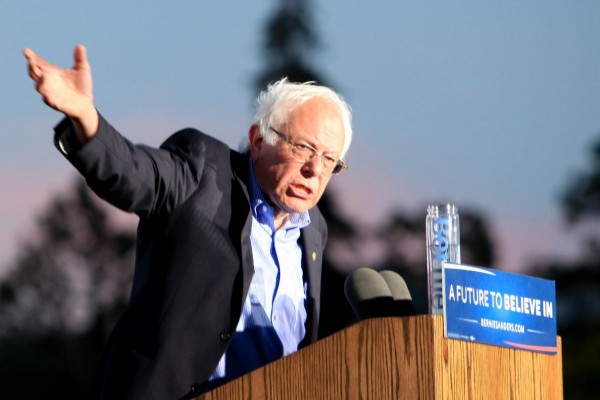The ‘S’ word in American politics—time for a reclamation
The story of socialism in the US has been one of mobilizing for workers’ rights and the expansion of the welfare state

Campaign poster for Eugene V. Debs and Ben Hanford, the Socialist Party’s candidates in the 1904 United States presidential election. Image courtesy the Library of Congress, Washington, DC.
On June 6, 1950, President Harry Truman addressed a gathering of the Association of Better Business Bureaus at the Shoreham Hotel in the nation’s capital. He praised the organization’s commitment to “private enterprise in the public interest.” In support of this principle, he pointed to the social and economic successes of the New Deal Coalition’s interventionist policies and programs. Truman also took aim at his opponents and those of his predecessor, Franklin D. Roosevelt, accusing them of anti-socialist fearmongering:
The campaign of propaganda is…telling us that the Republic is in peril, and that we are on the last mile, that socialism lies just ahead. The funny thing is that this has all been said before…It uses the same old slogans, the same old scare words, and the same old falsehoods. The only difference is that it sounds even more foolish now than it did 14 years ago.
Republicans found Truman’s upset victory in 1948 hard to believe and even harder to accept. This helps explain the Chicago Daily Tribune’s decision the day after the vote to print a front-page headline—based on early returns—falsely announcing Truman’s loss to Dewey. Truman was famously photographed a few days later, grinning sardonically as he showed the headline to reporters.
The parallels with today’s political landscape are noteworthy. First, there’s the disbelief. According to an Ipsos/Reuters poll in late May, a majority of Republicans remain in denial, clinging tenaciously to the conviction that Joe Biden did not legitimately win the 2020 election. Then there’s the propaganda. Biden’s legislative agenda has been the target of the same scare tactics that Truman decried in 1950. As before, the pejorative of choice has been the much-maligned ‘S’ word—“socialism.”
Republicans were quick to reject Biden’s $2.65 trillion (trimmed to $1.7 trillion on May 21) American Jobs Plan and $1.8 trillion American Families Plan as deficit-bloating government overreach. In classic red-baiting fashion, House minority whip Steve Scalise (R-La.) described the proposals as “Soviet-style” and part of a “radical socialist agenda.” Senator Tim Scott (R-S.C.) dismissed Biden’s plans for the nation as “socialist dreams.” Former Secretary of State Mike Pompeo warned that “every freedom-loving American” should be troubled by Biden’s “socialist vision.” Most recently, Senate minority leader Mitch McConnell (R-Ky.) rejected the President’s $6 trillion overall budget plan as a “radical vision” founded on “socialist daydreams.”
In his 2019 State of the Union address, Donald Trump proudly proclaimed that “America will never be a socialist country.” In his nomination acceptance speech the following year, he denounced rival Joe Biden as a “Trojan horse for socialism.” Biden, for his part, emphatically denied the charge:
I beat the socialists. That’s how I got elected. That’s how I got the nomination. Do I look like a socialist? Look at my career, my whole career. I am not a socialist.
Biden’s disclaimer was aimed in part at appeasing moderate Democrats such as Rep. Abigail Spanberger (D-Va.), who exhorted caucus members last November to “not ever use the word ‘socialist’ or ‘socialism’ again” if they wanted to avoid being “torn apart” in 2022.
The continuing use of the ‘S’ word as an ideological cudgel is to be expected. Most Americans don’t like what (they think) it represents. According to a 2018 Gallup poll, only 37 percent of American adults hold a positive view of socialism, a number that has held roughly level since 2010. Other polls have produced similar results. A 2019 Axios survey found that only 39 percent of adults have a “positive reaction” to the word; a Pew Research Center survey in the same year found that 42 percent have “a very or somewhat positive impression” of it; and a 2020 YouGov survey revealed that 31 percent have a “favorable” view of it, while also finding that 71 percent of Republicans and 18 percent of Democrats believe that Biden is a “socialist.” A Monmouth University poll in 2019 was less charitable, finding that only 10 percent of adults hold a positive view of socialism and 57 percent judge it to be incompatible with American values.
Notably, these polls did not define socialism for respondents, leaving them free to answer on the basis of often vague or confused understandings. The range in meaning appears to be quite broad. A separate Gallup poll in 2018 found that 23 percent of Americans define socialism as equality, 17 percent as state control of the economy, 10 percent as social welfare and public services, six percent as “talking to people, being social, social media, getting along with people,” another six percent in “non-specific” derogatory terms, and nearly a full quarter (23 percent) have no opinion, presumably because they aren’t sure what it is. This wild polysemy suggests that “socialism” has become more of a Rorschach inkblot than a precise referent in contemporary American politics.
None of this is especially surprising. Socialism is an umbrella term that covers nearly two centuries of utopian visions, political and economic theories, philosophical and ideological perspectives, reformist and revolutionary movements, and systems of national governance. The essential idea behind socialism is social (public or common) ownership of the means of production. This is pursued as an alternative to private ownership and market competition as organizing principles of economic activity. The impetus for early socialist thought in the 19th century was the recognition that the dramatic gains in productivity achieved through the Industrial Revolution had not improved quality of life for the bulk of the population.
Fears over growing inequality and the plight of the industrial proletariat under unfettered capitalism inspired a search for alternative forms of social organization. As the political philosopher Axel Honneth has argued, these efforts were guided by a desire to integrate the democratic ideals of the French Revolution into a “social freedom” that reconciled liberty with equality and fraternity. According to early socialist visions, full individual freedom could only be realized cooperatively and in solidarity with the freedom of others. The ideal was a society where the happiness of each depended on the happiness of all.
Outside of the sequestered intentional communities inspired by seminal utopian thinkers such as Charles Fourier, Henri de Saint-Simon and Robert Owen, the collectivization and empowerment of labour within capitalism has been at the core of socialist praxis since the mid-19th century. For Karl Marx, Friedrich Engels, and their followers, the contradictions inherent to bourgeois capitalist production would eventually lead to a revolt of the industrial proletariat and the birth of world-historical communism (Marx used the words socialism and communism interchangeably).
Revolutionary socialists such as Vladimir Lenin and Mao Zedong were unconsoled by the theoretical inevitability of communism. They aimed to leapfrog the stage of bourgeois domination altogether by forcibly imposing state socialism and a “dictatorship of the proletariat” fitted to the distinctive social conditions of their countries (Tsarist Russia for Lenin and agrarian China for Mao). Strong state socialism, they believed, was needed to accelerate social evolution toward communism. This administrative engineering justified command economies with complete control over national production and distribution.
By the late 20th century, however, actually existing socialism gave way to liberalization and global market integration. The self-described communist countries of the 21st century—China, Vietnam, Laos, and Cuba—are undeniably socialist market economies, and might even be characterized as examples of “state capitalism.” Even the hereditary dictatorship of North Korea, arguably the most totalitarian and deformed living example of “socialism from above” (its constitution still refers to socialism), now sustains a significant market economy, both state-sanctioned and informal.
At the libertarian end of socialism are the various branches of anarchism and syndicalism that have emerged since the 19th century. The focus of these groups has been on direct-action opposition to both state control and capitalism, decentralization of production, elimination of class and hierarchy, and the promotion of mutualism, federalism, and autonomy.
Finally, there are the traditions of democratic socialism and social democracy, well-represented in labour parties and worker organizations around the world today. Whether revolutionary or reformist, transformative or revisionist, democratic socialists and social democrats are committed to political action through the organs of representative democracy. They fight for a strong welfare state that can provide adequate health care, education, housing, and social security for all through the ameliorative redistribution of wealth. Their shared aims are to protect against the inequities and casualties of the market economy through government regulation and (to a greater or lesser extent) public ownership, establish fair labour practices, expand public investment, defend human rights, and pursue social and environmental justice at home and abroad.
In the short-term, the common economic mission of democratic socialists and social democrats is to reform, rather than abolish, market capitalism within the context of liberal democracy. They differ in their longer-term aims and commitments. Presently, there are five member of the US Congress who self-identify as democratic socialists, four in the House (Rashida Tlaib, Alexandria Ocasio-Cortez, Cori Bush, and Jamaal Bowman) and one in the Senate (Bernie Sanders).
As in most industrialized nations, the history of socialism in America is tightly interwoven with that of the labour movement. The legal rights and protections that workers count on today are in large part the result of strikes and political pressure by trade unions and labour organizations starting in the middle of the 19th century. The National Labor Relations Act, Fair Labor Standards Act, and Social Security Act of the 1930s were all denounced as “socialism” by many Republicans and business elites of the time. This foundational legislation, expanded and amended over the years, gave us the federal minimum wage, the 40-hour work week and eight-hour work day, overtime pay, equal pay protection, unemployment benefits, the right to organize and engage in collective bargaining, and much else. Few American workers today, Republican or Democrat, would be willing to give any of this up.
Committed socialists have sacrificed much over the years, often in the face of harassment and persecution, to achieve the rights and benefits that all workers and their families now take for granted. Socialists of all stripes—revolutionary, reformist, and otherwise—played active and prominent roles in the powerful labour federations of the late-19th and 20th centuries. These include the Knights of Labor, the American Federation of Labor, the Congress of Industrial Organizations, and especially, the Industrial Workers of the World (“Wobblies”), co-founded by the outspoken socialist Eugene Debs. Some lost their lives and many were injured or jailed for their participation in the often violent conflicts between labour and management. The 1905 Chicago Teamsters strike and the 1921 Battle of Blair Mountain in West Virginia are two tragic examples.
“At the Parting of the Ways,” a cartoon from the May 1919 Industrial Workers of the World periodical One Big Union which shows a worker representing the working class choosing between a path of craft unionism towards the AFL slogan “A Fair Day’s Pay for a Fair Day’s Work” and a path of industrial unionism towards the IWW slogan “Abolition of the Wage System.” Image from Wikimedia Commons.
In April, the Florida House of Representatives adopted Resolution 145, formally “denouncing democratic socialism in favour of the true American values of individual liberty, private property, and constitutional democracy.” Aside from suggesting that public ownership, investment, and regulatory control are fundamentally un-American, the main justification offered was that “in many nations that have relied upon democratic socialism to improve the lives of their citizens, the result has been economic and social chaos.” One can only wonder whether the Republican writers of the resolution believe that this has also been true in the US. If so, Medicare has surely contributed to the breakdown of society and should be eliminated immediately.
And what should we make of former President Trump’s four years of corporate socialism in this regard? The billions of dollars in tax breaks, royalty relief, and public investment in research and development for the fossil fuel industry. The billions in farm subsidies required to wage a failed trade war with China. The billions in canceled debt for the National Flood Insurance Program, which disproportionately assists environmentally vulnerable Republican states. The billions each year in federal redistribution from “maker” to “taker” states. South Carolina, for example, receives almost eight times as much federal funding as it collects in federal tax. Presumably, all this government intervention is as contrary to “true American values” as the Green New Deal. If so, it just as surely raises the spectre of Venezuela-like economic disaster.
In reality, democratic socialism is not associated with “economic and social collapse.” To the contrary, according to the 2020 World Happiness Report, Finland, Denmark, Norway, Sweden, and Iceland are consistently among the ten happiest countries the world, with citizens expressing the highest level of life satisfaction. These countries are social democracies, with mixed economies and extensive social welfare protections and benefits. The US ranks significantly lower in happiness, 18th according to 2017-2019 data, putting it just above the Czech Republic.
The happy Nordic countries are also among the highest in trade union density (membership rate), in contrast to the US, which ranks fifth lowest of all 36 OECD countries. Unionism in the US began declining noticeably in the late 1970s and never recovered, due mainly to increasingly effective corporate resistance, lack of federal and state support, economic transformation, and adverse cultural change. The weakening of America’s labour movement also helps explain the nation’s ever-widening income inequality.
According to the authors of the Happiness Report, the higher life satisfaction in Nordic countries is attributable to “generous and effective social welfare benefits” and citizens who “trust each other and governmental institutions.” These are defining features of well-functioning social democracy, and reflect the broader collectivistic ideals it shares with democratic socialism. Far from threatening “chaos,” these ideals and the legislation enacted in their name appear to make for healthier and happier societies.
On December 28 of last year, Rep. Victoria Spartz (R-Ind.) appeared on Fox News to warn against the growing danger of socialism in America. “I think we need to be good students of history,” she argued. “Our country, for the last century, fought against socialism and a lot of young kids died. I took my kids to the beaches of Normandy and you can see how many young kids died fighting for freedom.”
The Allies did indeed fight for freedom on the beaches of Normandy. But they did not battle socialism. Hitler’s anti-communist Nazi Party was socialist (“National Socialist”) in name only and eliminated all high-ranking members genuinely committed to socialism during the infamous Night of the Long Knives in 1934. Neither was Stalinist socialism the enemy. The Soviet Union, it will be remembered, joined the Allies in the Second World War.
Rep. Spartz is right in urging Americans to be good students of history. But she does not appear to be one herself. The story of socialism in the US has been one of mobilizing for workers’ rights, increased public investment, fair taxation, regulatory control, and the expansion of the welfare state to provide support and security to those who need it. This, not Stalinist repression, is what socialism has contributed to America’s way of life.
So what’s in a word? A lot, apparently. In 1888, the New England author Edward Bellamy published Looking Backward: 2000-1887, a utopian socialist novel depicting the benefits of a fully nationalized economy where production and distribution are controlled by the government. The book was a national bestseller, owing in part to Bellamy’s prudent use of the word “nationalism” in place of “socialism.” He wished to avoid the foreign (German and French) associations of the latter, fearing it would alienate his domestic readers.
Well over a century later, the ‘S’ word still evokes fear and distrust. It does so now because many Americans closely identify it with the failures of authoritarian socialist republics, past and present. Since the 1980s, this association has been reinforced by the Hayekian neoliberal argument that economic planning and control lead ultimately to oppression and fascism.
As President Biden seeks Congressional approval on a $6 trillion budget that will increase federal spending to a level unseen since the Second World War, it will become increasingly unconvincing to give in to popular misunderstanding and continue throwing “socialism” under the bus. The president and his administration would do better to reclaim and rehabilitate the word by highlighting the proud legacy of socialist activism within the American labour movement. They should also point to the contributions socialists have made in the political fight for social security and public investment, economic reform, civil rights, and more generally, the humanizing of market capitalism.
No, Joe, you’re not a socialist and never will be. We get that. But if your Republican adversaries continue to equate ambitious public spending and investment in a sustainable future with socialism, you might do better to stop protesting the word. Try educating the electorate on what they owe socialism in the shaping of “actually existing” American capitalism and liberal democracy. It wouldn’t hurt to also mention that Albert Einstein was a socialist. As were W.E.B. Du Bois and, arguably, Martin Luther King (although he was opposed to communism). Stop running from the ‘S’ word. Reclaim and elevate it. You might get more accomplished that way.
Harry Truman put it best back in 1952 while campaigning for Adlai Stevenson. Referring to his scaremongering critics, he claimed that “socialism is their name for almost anything that helps all the people.” If so, here’s to socialism!
Romin W. Tafarodi is Associate Professor of Psychology at the University of Toronto. He can be reached at [email protected].










